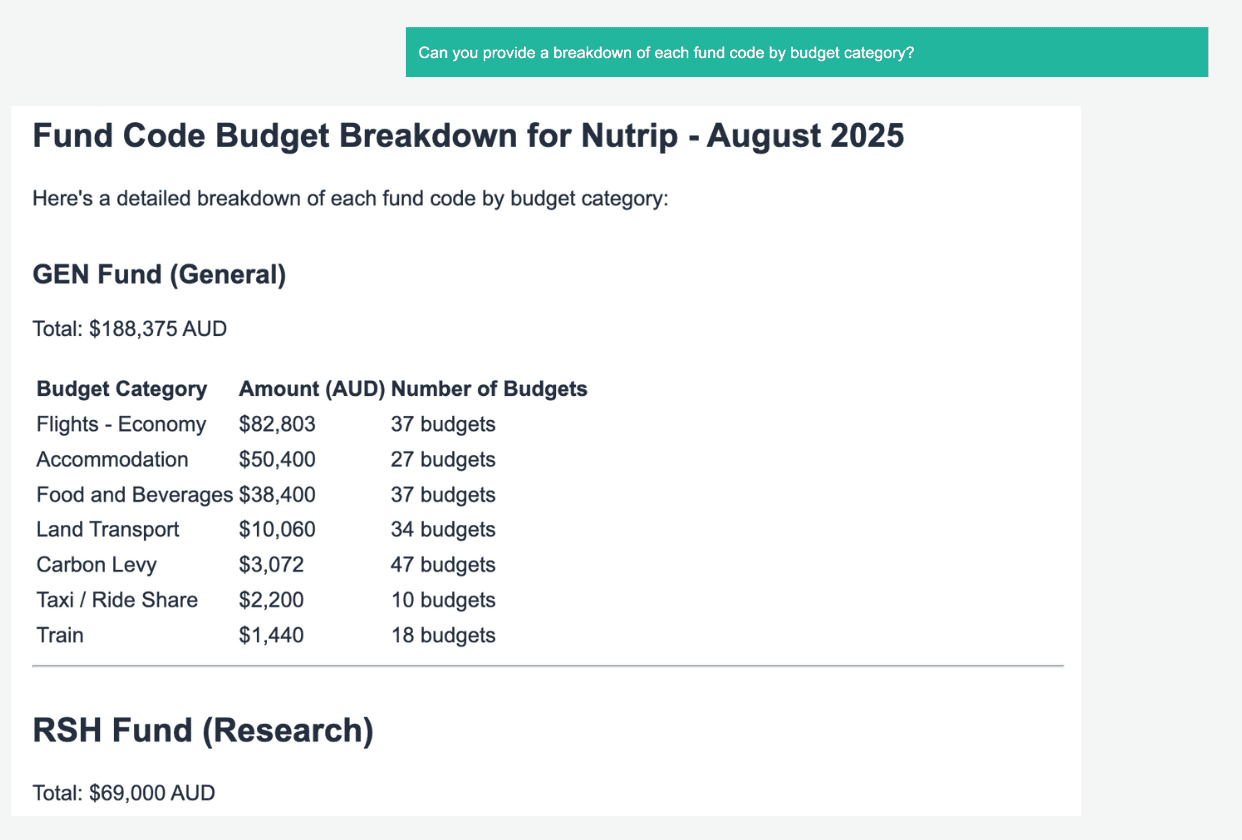
How AI Transforms Travel Finance Management
For most organisations, the monthly travel budget review means hours of wrestling spreadsheets. Finance teams extract data from multiple systems, create pivot tables, and manually identify spending anomalies. By the time insights emerged, the opportunity to proactively intervene had passed.
Today's AI-powered travel intelligence transforms reactive reporting into predictive intelligence that turns travel budgets from cost centres into strategic advantages.
The Conversational Breakthrough
Your organisation's Q3 travel spend shows a 23% increase over the previous quarter. Traditional analysis requires diving deep into expense categories and manually correlating data—a process taking days and often raising more questions than answers.
With AI-powered travel intelligence, finance managers simply ask: "What's driving our 23% increase in accommodation costs this quarter?" Within seconds, the system provides a comprehensive breakdown: 60% from unplanned conference attendance, 25% from changes to the original trip, and 15% from booking too close to the planned departure date.
Predictive Budget Intelligence
The real transformation happens when AI moves beyond explaining what happened to predicting what will happen. When the system detects booking patterns that historically lead to budget overruns, for example last-minute travel requests or travel to destinations during peak travel periods, it proactively alerts finance teams with specific recommendations.
A simple query like "will we exceed our Q4 budget at current spending rates?" returns detailed projections with suggested interventions, not just yes or no answers.
Real-Time Optimisation
Traditional budget management relies on monthly reviews with limited actionable value. AI provides continuous monitoring with immediate alerts. Finance teams can ask:
Each query returns structured data with context, trends, and recommendations. The system might reveal that while Engineering appears to be overspending, their trips generate measurable business outcomes justifying the investment; insights that would take weeks to compile manually.
Pattern Recognition and Cost Savings
AI identifies optimisation opportunities human analysis might miss. When asked "where can we reduce costs without impacting business objectives?", the models analyse booking patterns, supplier performance, seasonal pricing, and the objectives of the organisation.
Results might reveal that shifting certain bookings by two weeks consistently saves 30% on airfare, or that particular hotel chains offer better value during specific periods. These insights enable proactive procurement decisions rather than reactive cost-cutting.
Vendor Performance Intelligence
Managing vendor relationships becomes strategic when AI provides continuous performance analysis. Instead of annual reviews based on aggregated data, finance teams can query real-time metrics:
"How do our top three airlines compare on value this quarter?" returns comprehensive analysis including average ticket price on major sectors, number of changes, traveller loyalty membership, market share and on-time performance.
Scenario Planning Made Simple
AI enables sophisticated scenario planning previously impossible without dedicated analytics teams. Finance managers can model spending scenarios: "What would be the impact on the budget if we enforced a 21 day minimum advance booking period for all international trips?"
The system analyses historical patterns, price sensitivity, and business impact to provide detailed projections including potential savings, operational implications, and implementation strategies.
Strategic Financial Partnership
When travel spend becomes transparent and predictable, finance teams shift from reactive budget management to proactive financial strategy. They identify which travel investments generate highest returns, optimise cash flow through better booking timing, and provide business units with real-time budget guidance.
The transformation from spreadsheet analysis to conversational intelligence enables finance teams to become strategic partners in travel optimisation, turning discretionary expenses into competitive advantages.
Written by Simon Crunden